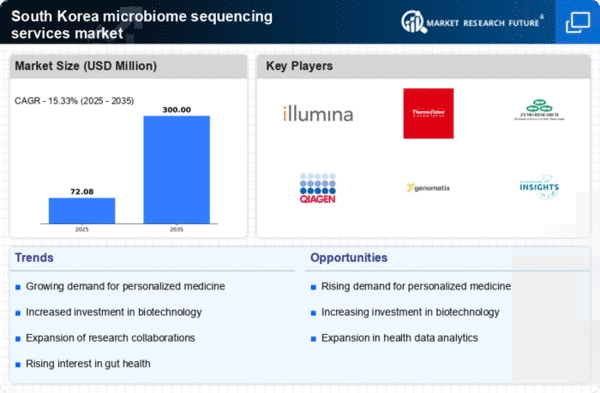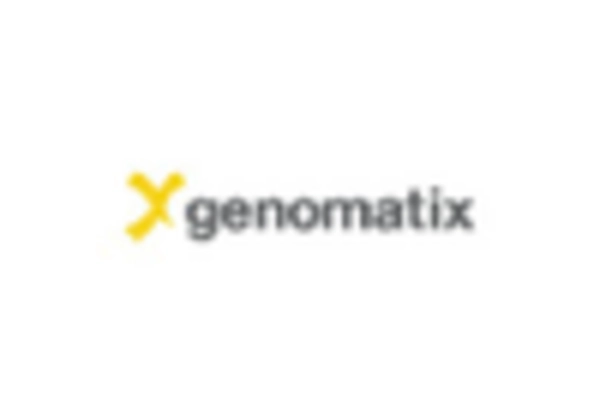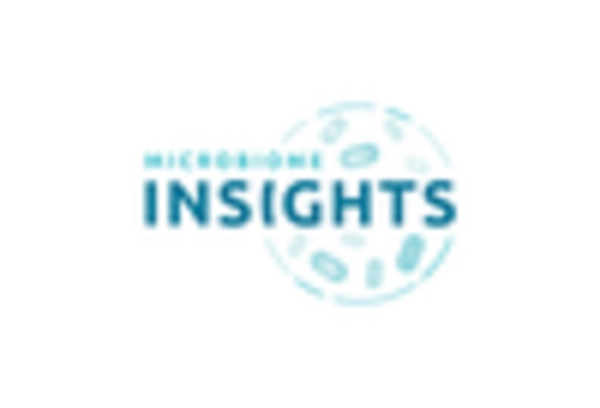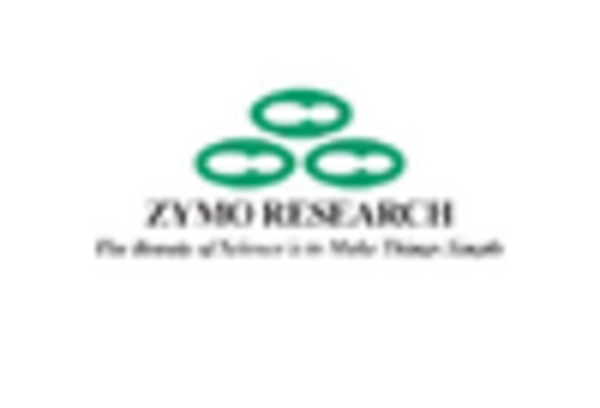Increased Research Funding
In South Korea, the microbiome sequencing-services market is benefiting from heightened research funding from both government and private sectors. The South Korean government has recognized the potential of microbiome research in addressing various health issues, allocating substantial budgets to support studies in this field. For instance, funding for microbiome-related projects has seen an increase of over 30% in recent years. This financial backing is facilitating advancements in sequencing technologies and methodologies, making them more accessible to researchers and healthcare professionals. As a result, the volume of microbiome studies is expected to rise, further driving the demand for sequencing services. The influx of funding is likely to stimulate innovation and collaboration among academic institutions and industry players, thereby enhancing the overall landscape of the microbiome sequencing-services market.
Growing Interest in Gut Health
The rising awareness of gut health among the South Korean population is significantly influencing the microbiome sequencing-services market. Consumers are increasingly recognizing the connection between gut microbiota and overall health, leading to a surge in demand for microbiome testing services. This trend is reflected in the growing market for probiotics and prebiotics, which are often marketed based on their effects on gut health. As individuals seek to optimize their microbiomes for better health outcomes, the demand for sequencing services is expected to rise. Additionally, educational campaigns and health initiatives promoting gut health are likely to further enhance consumer interest in microbiome analysis. This growing focus on gut health presents a substantial opportunity for the microbiome sequencing-services market to expand and innovate.
Rising Incidence of Chronic Diseases
The escalating prevalence of chronic diseases in South Korea is a significant driver for the microbiome sequencing-services market. Conditions such as obesity, diabetes, and gastrointestinal disorders are increasingly being linked to microbiome imbalances. As healthcare providers seek to understand the underlying causes of these diseases, the demand for microbiome analysis is expected to surge. Recent studies suggest that approximately 40% of the South Korean population may be affected by chronic diseases, highlighting the urgent need for effective diagnostic and therapeutic solutions. This trend is likely to encourage healthcare professionals to incorporate microbiome sequencing into routine clinical practice, thereby expanding the market. The potential for microbiome-based interventions to improve health outcomes further underscores the importance of this market in addressing public health challenges.
Technological Innovations in Sequencing
Technological advancements in sequencing technologies are playing a pivotal role in shaping the microbiome sequencing-services market in South Korea. Innovations such as next-generation sequencing (NGS) and metagenomics are enhancing the accuracy and efficiency of microbiome analysis. These technologies allow for comprehensive profiling of microbial communities, providing valuable insights into their roles in health and disease. The cost of sequencing has also decreased significantly, making it more accessible to researchers and clinicians. As a result, the adoption of these advanced technologies is expected to increase, driving the growth of the microbiome sequencing-services market. Furthermore, the development of user-friendly bioinformatics tools is likely to facilitate data interpretation, thereby attracting more stakeholders to invest in microbiome research and services.
Growing Demand for Personalized Medicine
The increasing emphasis on personalized medicine in South Korea is driving the microbiome sequencing-services market. As healthcare shifts towards tailored treatments, understanding individual microbiomes becomes crucial. This trend is reflected in the rising investments in microbiome research, with the market projected to reach approximately $500 million by 2027. Personalized approaches to health management, including diet and medication, are gaining traction, leading to a greater need for microbiome analysis. The integration of microbiome data into clinical practices is expected to enhance patient outcomes, thereby propelling the demand for sequencing services. Furthermore, collaborations between biotech firms and healthcare providers are likely to foster innovation in this sector, indicating a robust growth trajectory for the microbiome sequencing-services market.
















